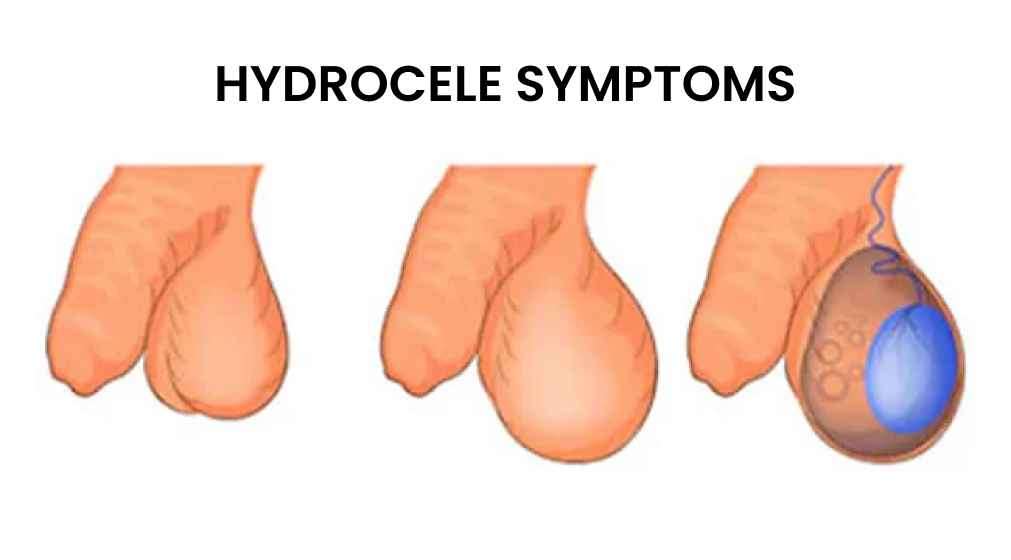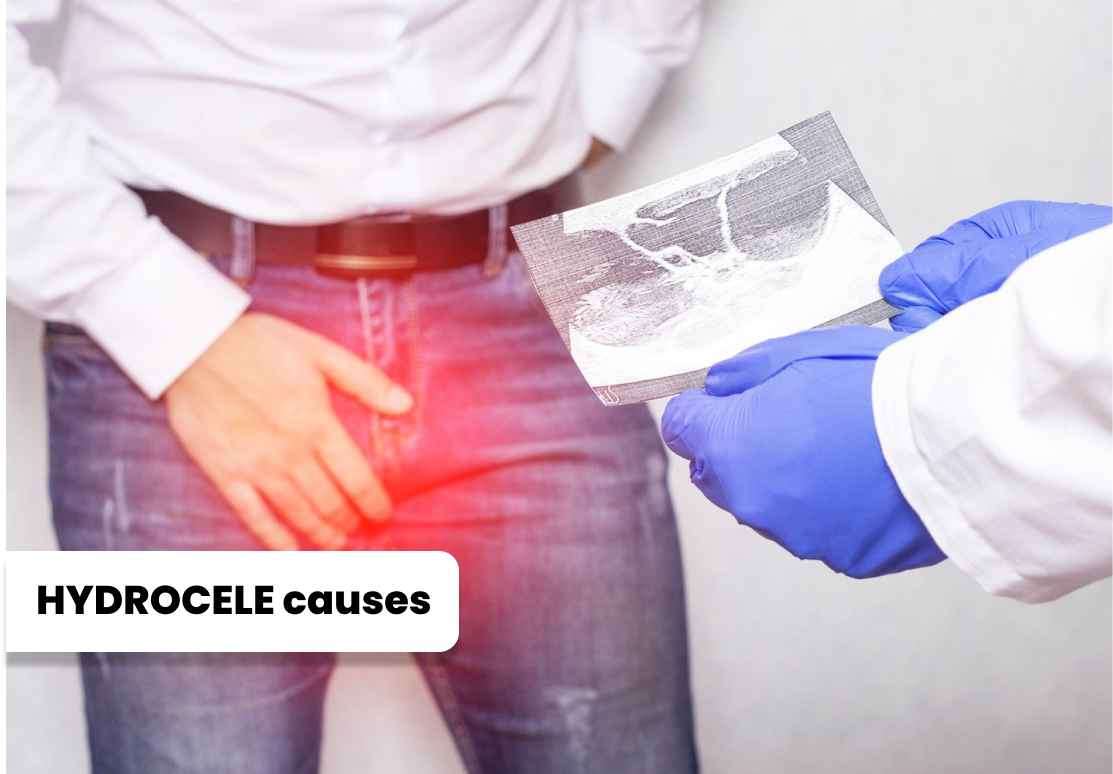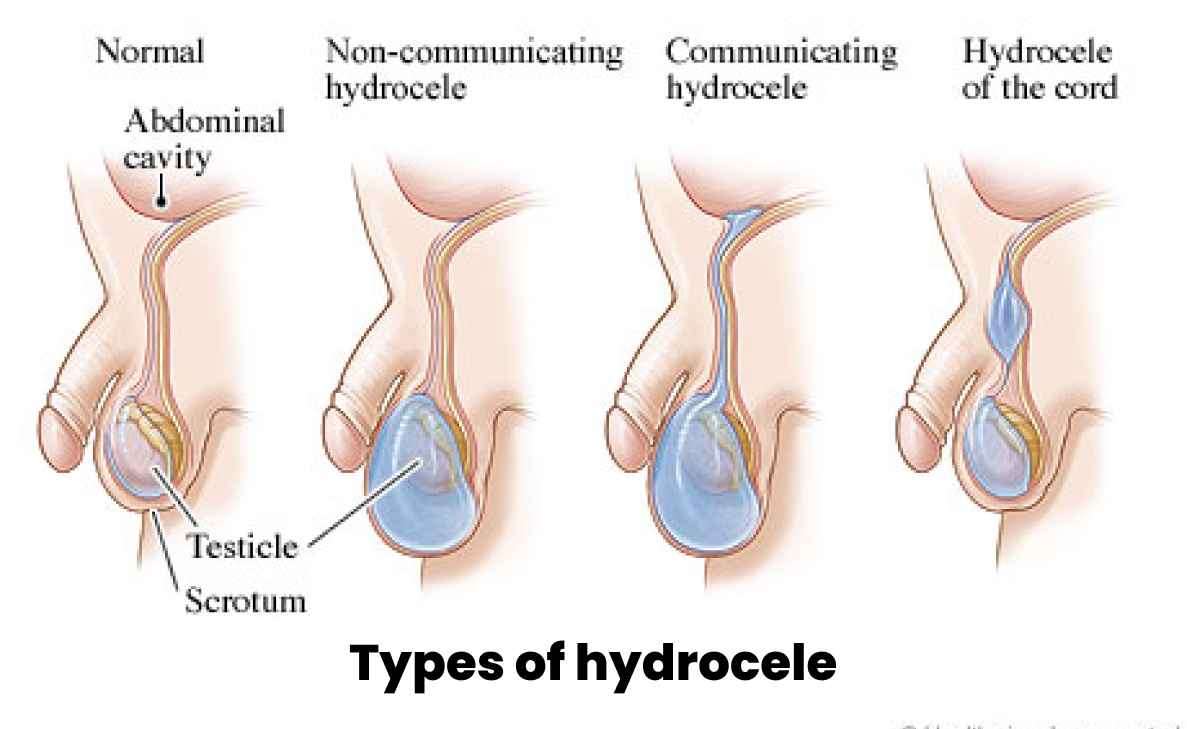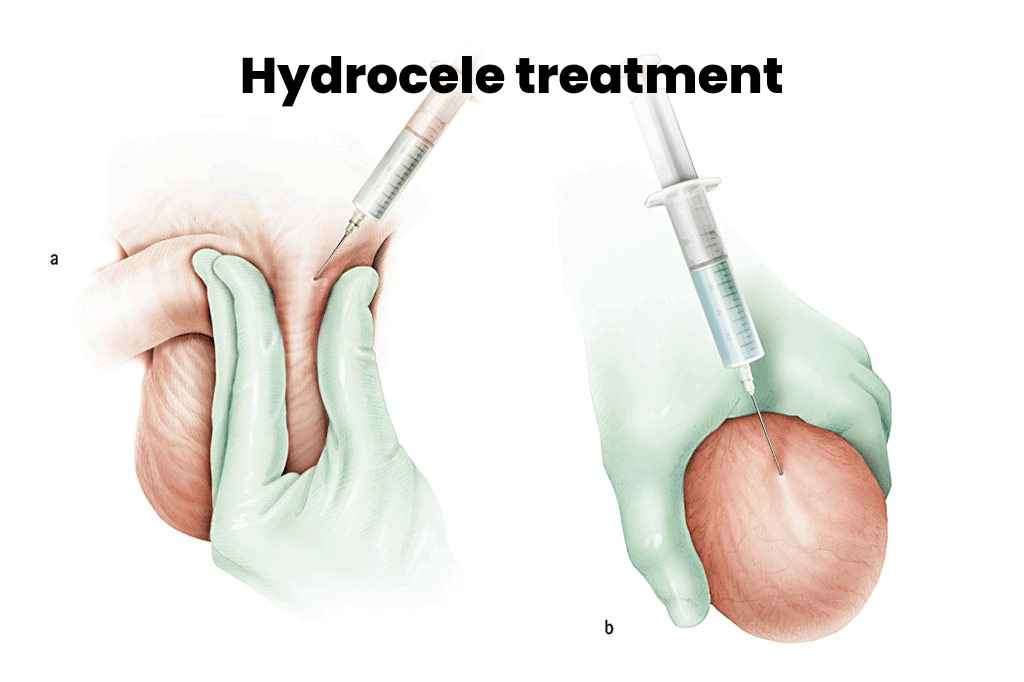A hydrocele is a condition characterized by the accumulation of fluid in
the sac surrounding the testicles, called the tunica vaginalis. The
tunica vaginalis normally contains a small amount of fluid to lubricate
the testicles, but in a hydrocele, the fluid accumulates and causes
swelling in the scrotum.
Call us to book an appointment with the best Urology specialist near you.
Hydrocele, a common condition affecting the male reproductive system, can cause discomfort and concern for those affected. Hydrocele is characterized by the accumulation of fluid in the sac surrounding the testes, known as the tunica vaginalis. This fluid buildup leads to the enlargement of the scrotum, causing swelling and discomfort.

Hydrocele, a common condition affecting the male reproductive system, can cause discomfort and concern for those affected. Hydrocele is characterized by the accumulation of fluid in the sac surrounding the testes, known as the tunica vaginalis. This fluid buildup leads to the enlargement of the scrotum, causing swelling and discomfort.
Symptoms of hydrocele often include a painless swelling of one or both sides of the scrotum. The enlarged area may be smooth and translucent, and the size can vary from small to large, depending on the severity of the condition. In some cases, individuals may experience a sense of heaviness or pressure in the scrotum.

Symptoms of hydrocele often include a painless swelling of one or both sides of the scrotum. The enlarged area may be smooth and translucent, and the size can vary from small to large, depending on the severity of the condition. In some cases, individuals may experience a sense of heaviness or pressure in the scrotum.
The causes of hydrocele can be classified into two categories: primary and secondary. Primary hydrocele, also known as idiopathic hydrocele, occurs due to the incomplete closure of the processus vaginalis, a tubular structure through which the testes descend into the scrotum during fetal development. Secondary hydrocele can be caused by various factors such as infection, injury, inflammation, or underlying medical conditions that affect the flow of fluid in the scrotum.

The causes of hydrocele can be classified into two categories: primary and secondary. Primary hydrocele, also known as idiopathic hydrocele, occurs due to the incomplete closure of the processus vaginalis, a tubular structure through which the testes descend into the scrotum during fetal development. Secondary hydrocele can be caused by various factors such as infection, injury, inflammation, or underlying medical conditions that affect the flow of fluid in the scrotum.
One particular type of hydrocele is known as the hydrocele of the canal of Nuck. The canal of Nuck is a remnant of the inguinal canal in females. Although it typically closes during development, it may remain open in some cases, leading to the development of a hydrocele. This type of hydrocele is predominantly found in females and is relatively rare. Another classification of hydrocele is congenital hydrocele and acquired hydrocele. Congenital hydrocele refers to hydroceles that are present at birth and are usually caused by the persistence of the processus vaginalis. Acquired hydrocele develops later in life and can be caused by factors such as trauma, infection, or inflammation. It is important to note that hydrocele can sometimes be associated with a condition called hydrocele hernia, which occurs when a portion of the intestine protrudes into the scrotum. This requires immediate medical attention as it can lead to serious complications.

One particular type of hydrocele is known as the hydrocele of the canal of Nuck. The canal of Nuck is a remnant of the inguinal canal in females. Although it typically closes during development, it may remain open in some cases, leading to the development of a hydrocele. This type of hydrocele is predominantly found in females and is relatively rare.
Another classification of hydrocele is congenital hydrocele and acquired hydrocele. Congenital hydrocele refers to hydroceles that are present at birth and are usually caused by the persistence of the processus vaginalis. Acquired hydrocele develops later in life and can be caused by factors such as trauma, infection, or inflammation.
It is important to note that hydrocele can sometimes be associated with a condition called hydrocele hernia, which occurs when a portion of the intestine protrudes into the scrotum. This requires immediate medical attention as it can lead to serious complications.
When it comes to the treatment of hydrocele, the approach depends on the severity of the condition and the level of discomfort experienced by the individual. In some cases, observation may be sufficient, especially if the hydrocele is small and causing no pain or complications. However, if the hydrocele is large, causing discomfort, or affecting daily activities, medical intervention may be necessary. Medications are generally not effective in treating hydroceles, and surgery is often the preferred treatment option. Hydrocele surgery involves the removal of the excess fluid and closure of the communication between the abdominal cavity and the scrotum. This procedure is known as hydrocelectomy and can be performed as an open surgery or using minimally invasive techniques, such as laparoscopy or needle aspiration.

When it comes to the treatment of hydrocele, the approach depends on the severity of the condition and the level of discomfort experienced by the individual. In some cases, observation may be sufficient, especially if the hydrocele is small and causing no pain or complications. However, if the hydrocele is large, causing discomfort, or affecting daily activities, medical intervention may be necessary.
Medications are generally not effective in treating hydroceles, and surgery is often the preferred treatment option. Hydrocele surgery involves the removal of the excess fluid and closure of the communication between the abdominal cavity and the scrotum. This procedure is known as hydrocelectomy and can be performed as an open surgery or using minimally invasive techniques, such as laparoscopy or needle aspiration.
|
Serial No |
City |
Minimum Cost (INR) |
Average Cost (INR) |
|
1 |
Mumbai |
10000 |
25000 |
|
2 |
Delhi |
8000 |
20000 |
|
3 |
Bangalore |
8000 |
18000 |
|
4 |
Chennai |
7000 |
15000 |
|
5 |
Kolkata |
7000 |
15000 |
|
6 |
Hyderabad |
6000 |
14000 |
|
7 |
Pune |
6000 |
12000 |
|
8 |
Ahmedabad |
5000 |
12000 |
|
9 |
Jaipur |
5000 |
10000 |
|
10 |
Chandigarh |
5000 |
10000 |
|
11 |
Lucknow |
4000 |
8000 |
|
12 |
Indore |
4000 |
8000 |
|
13 |
Kochi |
4000 |
8000 |
|
14 |
Coimbatore |
3500 |
7000 |
|
15 |
Bhopal |
3500 |
7000 |
|
16 |
Nagpur |
3000 |
6000 |
|
17 |
Goa |
3000 |
6000 |
|
18 |
Mangalore |
2500 |
5000 |
|
19 |
Trivandrum |
2500 |
5000 |
|
20 |
Guwahati |
2000 |
4000 |
|
Serial No |
Hospital Name |
Address |
Contact Number |
|
1 |
All India Institute of Medical Sciences (AIIMS) |
Ansari Nagar, Aurobindo Marg, New Delhi - 110029 |
+91-11-26588500 |
|
2 |
Safdarjung Hospital |
Safdarjung Campus, Ansari Nagar, New Delhi - 110029 |
+91-11-26165060 |
|
3 |
Post Graduate Institute of Medical Education and Research (PGIMER) |
Sector-12, Chandigarh - 160012 |
+91-172-2747585 |
|
4 |
King George's Medical University (KGMU) |
Chowk, Lucknow, Uttar Pradesh - 226003 |
+91-522-2257450 |
|
5 |
All India Institute of Medical Sciences (AIIMS) |
Saket Nagar, Bhopal, Madhya Pradesh - 462020 |
+91-755-2672355 |
|
6 |
Nizam's Institute of Medical Sciences (NIMS) |
Punjagutta, Hyderabad, Telangana - 500082 |
+91-40-23489000 |
|
7 |
Government Medical College and Hospital (GMCH) |
Sector 32, Chandigarh - 160030 |
+91-172-2601023 |
|
8 |
Institute of Medical Sciences (IMS), Banaras Hindu University (BHU) |
Lanka, Varanasi, Uttar Pradesh - 221005 |
+91-542-2367568 |
|
9 |
Osmania General Hospital |
Afzal Gunj, Hyderabad, Telangana - 500012 |
+91-40-24600146 |
|
10 |
Government Medical College and Hospital (GMCH) |
Sector 32, Chandigarh - 160030 |
+91-172-2601023 |
Please Wait..